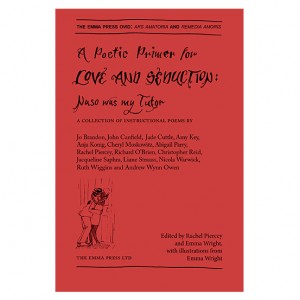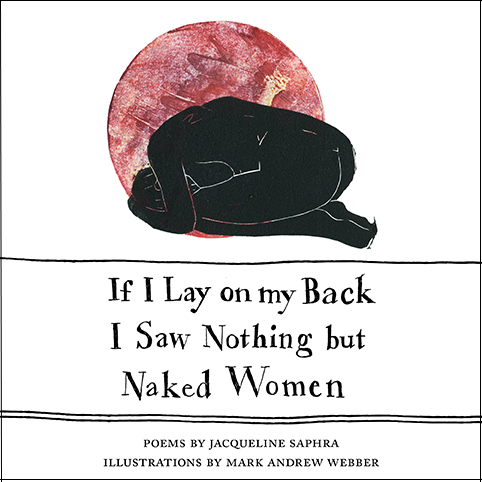A Poetic Primer for Love and Seduction: Naso was my Tutor
-Reviewed by Angelina D‘Roza-
The Emma Press, founded in 2012, is “dedicated to producing books which are sweet, funny and beautiful”. The Poetic Primer, inspired by Ovid’s Ars Amatoria and Remedia Amoris, follows on the heels of their Anthology of Mildly Erotic Verse. The Primer has 15 contributors, 21 poems, and is divided into two sections: “The Art of Love” and “Cures for Love”. It looks gorgeous in seductive red binding, with illustrations and cream pages, and the attention that’s gone into production values is also evident in the preface: “Our purpose in creating this book has been to provide the average student with such knowledge and understanding as are essential to the art of love. Love may be wild and unpredictable, but as with all arts it can be mastered …“. This mirrors Ovid’s own pseudo-imperious opening to Ars Amatoria, and sets the tone early.
The Primer is varied in its satirical mocking of modern love, and the irreverent manipulation of classical motifs keeps the loose relationship with Ovid interesting. Love is a fight, for Ovid, strategic and combative, which is an approach that proves enduring. In Jo Brandon’s “Forget What You’ve Been Told”: “Real love is painful, / a cigarette butt to the heart. / Any loss of love will burn right through you.” I like how the cigarette scar of dysfunctional love twists classical images of love’s flame and the piercing arrow into modern mutilation. Brandon’s writing is swift, stinging about our preoccupations with wedding lists and thank you cards, though the poem could have stood more focus on the specifics, the paraphernalia of romance and heartbreak. The images here are more fleeting than elsewhere in her work, but the satire of the last stanza owes much to that earlier picture of marriage:
Love does not equal happiness.
Happiness apes love,
it is a new-fangled measure of longevity.
If love always equates to happiness
I’m afraid you’re still
doing it all wrong.
The best teachers were the ones who wove something of themselves into class, so that the lesson could only have been given by them. And the most memorable poems in the Primer break down the big themes to an individual moment, a nuanced angle; they know something more. Christopher Reid’s “The Connoisseur”, describes how to share wine with your lover:
When lips touch, tip the whole lot
into the opposite mouth, as it readily opens.
Most will come back, warmer, but still
with a chill edge to it, and tastily laced
with saliva …
The moment being told is intimate, but so is the telling. Ruth Wiggins’s “Seduction” is similarly knowing. It’s persuasive, and full of advice you won’t get in Cosmo:
Afraid to reach for coffee on the shelf?
Worried he might catch a glimpse –
the unruly glitter of your pretty armpit?Go on, reach.
He’ll go home with a taste of the illicit.
If he goes home at all, that is.
Some of the counsel is predictable, but the big sisterly voice knows what she’s talking about. She’s been there, not just in love, but more specifically, reaching for the coffee. And if the women are manipulative, men are dupes. This is the art of war. I mean love.
The Primer contains only four male poets, and I wonder why. But in the end, it doesn’t matter. Some of the poems are addressed to women, some to men, some to both, or either, or to love, but the book is unisex. There’s a breadth of style that hangs together across the anthology, and helps counter the potential for love’s recurring themes to become repetitious. Compare Reid’s poem, with Anja Konig’s spare evocation: “A single artificial star should streak / and die, / then dark / must be restored. // This most affects / the melancholic audience.” (“The Theory of Fireworks”); and Abigail Parry’s play with form in “The Lesson from the Snake”, the stanzas laid out to embody the snake’s duplicity:
In “Advice to Members of the Uniformed Professions”, Richard O’Brien has fun with men and women in uniform, and the new online dating services that cater for those who want to play doctors and nurses:
… without
the stethoscope’s cold tongue against her breasts,
the whistle dangling between your teeth,
how else are they to know that you are you?
If Ovid gives us a picture of ancient Rome, O’Brien tells us something about our shallow dating fantasies, in crisp, critical verse.
The Emma Press set out to make a funny, beautiful book, and that’s what they have. There’s room for another voice, something to thicken the mix a little, to keep us coming back, but the Poetic Primer is an enjoyable (and educational) read.







